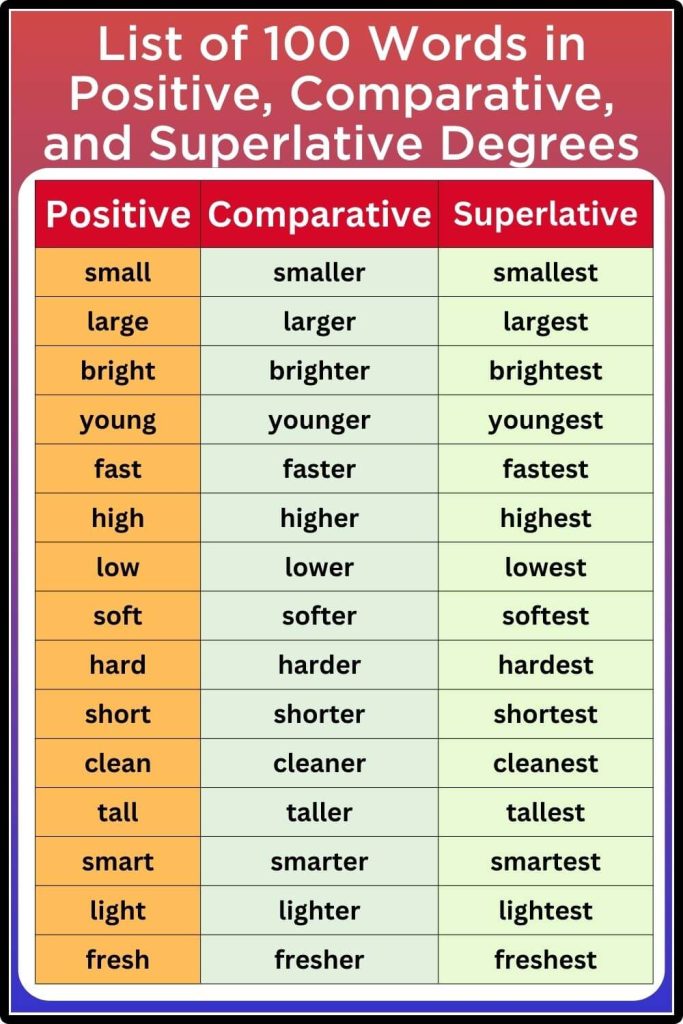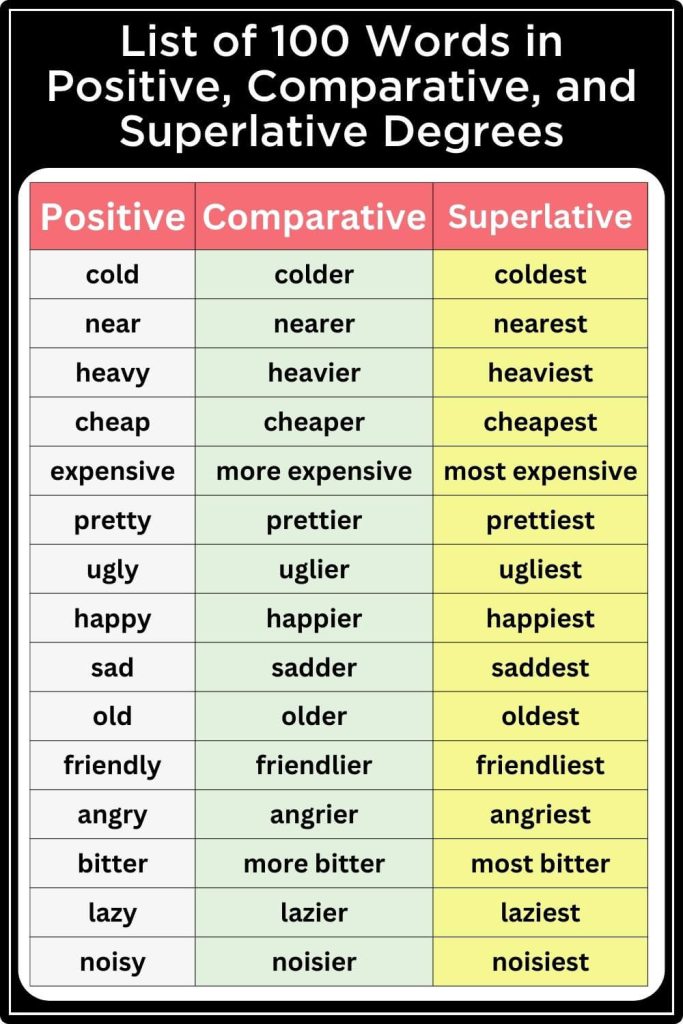Ever wonder how to make comparisons or describe the best of something in English? Understanding positive comparative and superlative forms can help you do just that! In this guide, we’ll break down each degree and provide a list of 100 words in each form, giving you a strong foundation in English adjectives and their comparative forms
Definition of Degree
In English grammar, a “degree” is the form of an adjective or adverb that indicates the intensity or level of a quality. Degrees are used to compare qualities or describe something’s characteristics, ranging from basic descriptions to showing the most or least of a quality.
Types of Degree
There are three main degrees of comparison in English:
- Positive Degree: Describes a basic quality without any comparison.
- Comparative Degree: Compares two things, showing one has more or less of a quality.
- Superlative Degree: Highlights the highest or lowest quality among three or more items.
What are Positive, Comparative, and Superlative Degrees?
In English grammar, degrees of comparison allow us to describe qualities and compare them across different nouns. These degrees—positive, comparative, and superlative—help in expressing adjectives and adverbs with varying levels of intensity or quantity.
Positive Degree
The positive degree is the base form of an adjective or adverb. It describes a quality without making any comparison. For example:
- The car is fast.
- He is tall.
Here, “fast” and “tall” simply describe the nouns without suggesting that one is faster or taller than another. Positive-degree adjectives give a simple description without comparison.
Comparative Degree
The comparative degree is used when comparing two things, showing that one has more or less of a quality than the other. Comparative adjectives often end in “-er” or are preceded by the words “more” or “less.” For example:
- The car is faster than the bike.
- She is taller than her sister.
- This book is more interesting than that one.
In these examples, “faster,” “taller,” and “more interesting” compare two items, indicating that one possesses a greater (or lesser) degree of a certain quality.
Superlative Degree
The superlative degree expresses the highest or lowest level of a quality among three or more items. Superlative adjectives usually end in “-est” or are preceded by “most” or “least.” For example:
- This is the fastest car in the race.
- She is the tallest in her class.
- This is the most interesting book I’ve ever read.
Here, “fastest,” “tallest,” and “most interesting” indicate that these qualities are the most intense or extreme when compared to multiple items. The superlative degree highlights the maximum or minimum extent of a quality.
Summary of the Degrees of Comparison:
Degree | Description | Example |
| Positive | Basic quality, no comparison | The mountain is high. |
| Comparative | Compares two entities, indicating more or less | The mountain is higher than the hill. |
| Superlative | Shows the highest or lowest degree among three or more items | Mount Everest is the highest mountain. |

List of 100 Words in Positive Comparative and Superlative Degrees
Here is a list of common adjectives with their positive comparative and superlative forms.
| Positive | Comparative | Superlative |
| small | smaller | smallest |
| large | larger | largest |
| bright | brighter | brightest |
| young | younger | youngest |
| fast | faster | fastest |
| high | higher | highest |
| low | lower | lowest |
| soft | softer | softest |
| hard | harder | hardest |
| short | shorter | shortest |
| clean | cleaner | cleanest |
| tall | taller | tallest |
| smart | smarter | smartest |
| light | lighter | lightest |
| fresh | fresher | freshest |
| close | closer | closest |
| thick | thicker | thickest |
| thin | thinner | thinnest |
| rich | richer | richest |
| poor | poorer | poorest |
| sweet | sweeter | sweetest |
| bitter | bitterer | bitterest |
| strong | stronger | strongest |
| weak | weaker | weakest |
| brave | braver | bravest |
| kind | kinder | kindest |
| fine | finer | finest |
| hot | hotter | hottest |
| cold | colder | coldest |
| near | nearer | nearest |
| heavy | heavier | heaviest |
| cheap | cheaper | cheapest |
| expensive | more expensive | most expensive |
| pretty | prettier | prettiest |
| ugly | uglier | ugliest |
| happy | happier | happiest |
| sad | sadder | saddest |
| old | older | oldest |
| friendly | friendlier | friendliest |
| angry | angrier | angriest |
| bitter | more bitter | most bitter |
| lazy | lazier | laziest |
| noisy | noisier | noisiest |
| gentle | gentler | gentlest |
| proud | prouder | proudest |
| wise | wiser | wisest |
| clear | clearer | clearest |
| bright | brighter | brightest |
| simple | simpler | simplest |
| healthy | healthier | healthiest |
| large | larger | largest |
| rare | rarer | rarest |
| common | more common | most common |
| important | more important | most important |
| famous | more famous | most famous |
| dangerous | more dangerous | most dangerous |
| beautiful | more beautiful | most beautiful |
| popular | more popular | most popular |
| powerful | more powerful | most powerful |
| gentle | gentler | gentlest |
| wonderful | more wonderful | most wonderful |
| dull | duller | dullest |
| loud | louder | loudest |
| sharp | sharper | sharpest |
| happy | happier | happiest |
| sour | sourer | sourest |
| spicy | spicier | spiciest |
| big | bigger | biggest |
| simple | simpler | simplest |
| bright | brighter | brightest |
| bitter | bitterer | bitterest |
| tasty | tastier | tastiest |
| wealthy | wealthier | wealthiest |
| smooth | smoother | smoothest |
| lazy | lazier | laziest |
| clever | cleverer | cleverest |
| heavy | heavier | heaviest |
| dark | darker | darkest |
| lucky | luckier | luckiest |
| lively | livelier | liveliest |
| happy | happier | happiest |
| dusty | dustier | dustiest |
| sharp | sharper | sharpest |
| thin | thinner | thinnest |
| sad | sadder | saddest |
| shy | shyer | shyest |
| grim | grimmer | grimmest |
| mad | madder | maddest |
| rough | rougher | roughest |
| calm | calmer | calmest |
| great | greater | greatest |
| fancy | fancier | fanciest |
| lovely | lovelier | loveliest |
| clean | cleaner | cleanest |
| dim | dimmer | dimmest |
| ripe | riper | ripest |
| mighty | mightier | mightiest |


Summary
Mastering positive comparative and superlative forms of adjectives is essential for making accurate comparisons in English. With this list of 100 adjectives in each degree, you’ll be able to describe, compare, and highlight qualities more confidently in your everyday conversations. Practicing these forms will strengthen your English vocabulary and improve your ability to express yourself in various situations!

